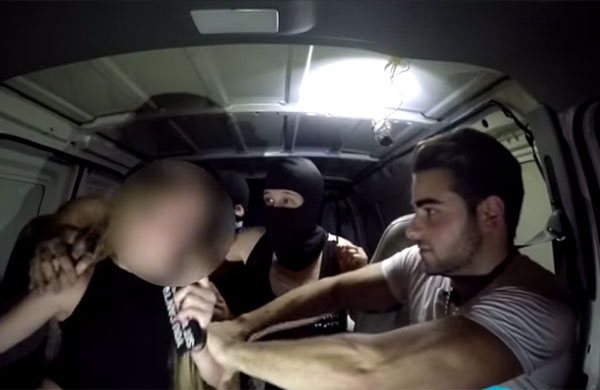 What is a visit to Israel with your family, as a tourist or for a bar mitzvah, without a visit to the Western Wall and a welcome from Rabbi Sam Kassin?
What is a visit to Israel with your family, as a tourist or for a bar mitzvah, without a visit to the Western Wall and a welcome from Rabbi Sam Kassin?
Anyone who has celebrated their child’s bar mitzvah at the Kotel—or the Western Wall—has been welcomed by “Rabbi Sammy,” who always assists families with all their preparations, assures that every detail is seen to, and provides references for caterers, photographers and other on-the-ground help. “Rabbi Sammy” is known for  making bar mitzvahs extra special by helping with logistics, attending the family simcha and dancing with the boy.
making bar mitzvahs extra special by helping with logistics, attending the family simcha and dancing with the boy.
“When people from the community travel to Israel, especially for a simcha, it is important to them that every detail is taken care of and this is difficult to manage from 6,000 miles away,” said Rabbi Sammy. “I understand this and try to help make their special occasion go as smoothly as possible.”
The Western Wall, where these celebrations take place, is just a short walk from the Shehebar Sephardic Center, located in Jerusalem’s Old City and founded by Rabbi Kassin more than three decades ago, along with Rabbi Eliyahu Shamoula, the center director. Home to the Abe M. and Geri Cohen Rabbinical Program, the yeshivah has graduated and placed more than 150 rabbis in Sephardic congregations around the globe.
According to Rabbi Kassin, “Long ago I recognized that there was a need for well-trained Sephardic rabbis who could carry on our heritage.” The son of Ezra and Esther Kassin, Rabbi Sammy is a descendant of a long chain of rabbis dating back to 1540. “I grew up in the community, and when I decided to become a rabbi, there was no such program. I founded the SSC to fill the critical gap of providing well-trained Sephardic rabbis who not only knew Jewish law and Torah, but the minhag of Sephardim.”
SSC rabbis now lead congregations on practically every continent in cities such as Shanghai, Buenos Aires, Madrid, Serbia, Thessalonki, Milan, London, Prague, Istanbul, Moscow, Caracas, Panama, Curacao, and Rio de Janeiro to name a few, as well as across the United States. Travelers to these cities and Sephardic congregants can count on the fact that the Sephardic rabbi was trained under the expert supervision of Rabbi Kassin, Rabbi Shamoula and their professional rabbinical staff.
These rabbis have not only mastered Torah learning, they have also acquired the practical knowledge and leadership skills necessary to lead a community. This practical knowledge includes public speaking, psychology, philosophy, and family counseling. The SSC inspires rabbinical trainees to ask difficult questions and identify answers in Jewish law. They are taught methodology and the analytical skills needed as a foundation for further Torah study. The well-rounded curriculum includes Talmud, Tanakh and Halakha and helps the rabbis to become scholars and teachers.
In fact, 12 of the Syrian Sephardic community’s rabbis were trained at the SSC, including Rabbi Dr. Richard Hidary, Rabbi Ari Azancot, Rabbi David Candiotti, and Rabbi Haim Shaul.
“The best thing about studying at the SSC besides the high level of dedication was the development of a sense of purpose with young rabbis from around the world in teaching and promoting Judaism and Jewish values,” said Rabbi Dr. Joe Angel, who specializes in the 2nd Temple era of Jewish history as a lecturer at Yeshiva University.
The SSC overlooks the Kotel, the location that was home to the First and Second Temple and its students are inspired to reach higher in their scholarship. Students attending the yeshivah study in small classes where they receive personal attention and are taught a varied curriculum that maximizes their development.
“The SSC provided me with personal attention from experts in Halakha within an atmosphere of students who are devoted to the study and spread of Torah around the world. This continues to be an inspiration to me,” said Rabbi Dr. Richard Hidary.
Such a high-level of training can only be appreciated in context. Here in the community, we have built an infrastructure envied by Jewish communities around the world. Not only does the community have shuls and yeshivot, it has a community center, a Bikur Holim, career services, mikvot, treatment programs, senior citizen housing and programs and so much more. Community members host mincha services in their businesses. The Brooklyn/Deal community as a whole works together, identifies different cultural, social, and religious needs and its leaders identify solutions together.
But that type of communal environment does not exist in Bangkok or Seattle or Atlanta, where there is most likely only one Sephardic rabbi, not a network of rabbis such as we have in the New York/New Jersey area where the majority of our community resides. In most communities, whether in a large city or remote area, the congregation rabbi must be competent and qualified enough to answer most questions that arise during his tenure. Therefore, the accredited and thorough training at the SSC is essential to assuring that the rabbi is a learned Torah scholar and a true leader who can provide answers to his congregation.
In addition, the SSC has other programs to meet the needs of communities worldwide. For example, the Mikdash Shaul Dayyanut Program prepares students to serve as judges on a Bet Din. Fifteen alumni have successfully completed this program since it began a decade ago. The Leah Ben Dahan Spanish Program caters to Spanish speaking men from around the world so they can return to their native countries and be spiritual leaders in their communities. The Russian School Program has a series of yeshivot in Russia and Uzbekistan with over 1,000 students. The program provides religious education and prepares students for aliyah to Israel where they attend religious schools.
Finally, the Shehebar Sephardic Center in Hong Kong serves the growing Sephardic Community there as well as serving international Jewish visitors who come for business and tourism. New synagogues in Beijing and Shanghai were opened recently under the auspices of the SSC. These new shuls also have Sephardic congregants who live in the area and cater to the escalating number of Jewish visitors who visit the city each year for international trade.
Truly, the SSC has filled a much-needed gap by training Sephardic rabbis in the minhag of true Sephardic tradition. Around the world, a multitude of communities have been positively affected by having an SSC rabbi lead their community and build the kahal (congregation).
And in today’s jet age, where Brooklyn’s community members travel extensively, individuals are assured that they can maintain their Jewish lifestyle when they visit any shul where there is an SSC rabbi, daily prayer and religious study. Whether they are in Beijing, Russia or South Africa, or wherever, Sephardic Jews can find a shul with an SSC rabbi who will cater to their spiritual needs.
On your next trip to Israel, when visiting the Kotel, take a few minutes to walk to The Shehebar Sephardic Center and visit with Rabbi Sammy. Guests will be impressed by the rabbinical program. The SSC is truly changing the world through education.
For a complete listing of SSC rabbis and their phone numbers visit www.ssc.org.il. You can email the New York office at ssc@bentex.com or call as at (646) 524-2999.
__________________
Community member Sarina Roffe has been a longtime contributor to IMAGE as well as many Jewish publications. She holds a BA in journalism from the University of Maryland and an MA in Jewish Studies from Touro College. Roffe is well-respected community historian, an award-winning writer.



